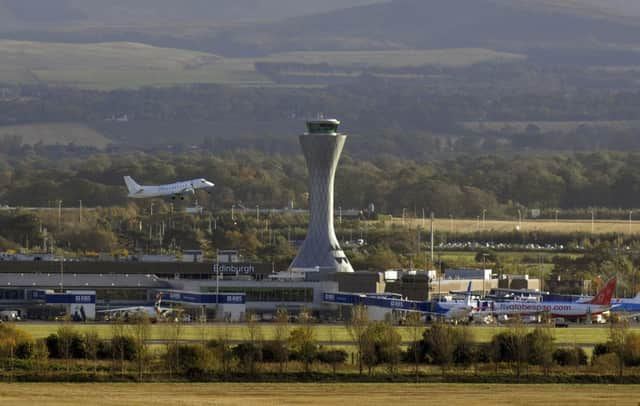Passengers face delays on one in four Scottish flights


Passengers suffered delays on more than one in four flights at Scotland’s busiest airports last year.
Advertisement
Hide AdAdvertisement
Hide AdThe slump in time-keeping has accompanied major aviation growth, but the airports said most hold-ups were caused by airlines or factors such as bad weather, strikes and the need to reform congested airspace.
Flights at Edinburgh suffered the most delays in the year to March, according to analysis of official Civil Aviation Authority (CAA) figures by consumer group Which?
A total of 27.3 per cent of its 112,000 flights were more than 15 minutes late – the industry measure – compared to 15 per cent in 2013-14. Average delays increased from nine to nearly 15 minutes.
The airport handled an extra million passengers each year over that period – the total has now reached 12.7 million annually.
At Glasgow, 25 per cent of nearly 85,000 flights were late, compared to almost 16 per cent three years ago. The airport has grown from 8 to 9.5 million passengers.
Average delays lengthened from ten to nearly 14 minutes.
Fewer Aberdeen flights were delayed – 21.5 per cent – but they increased from 19 per cent in 2014-15, the last available. Average waits were up from 11 to nearly 14 minutes.
The CAA, the UK’s aviation regulator, said the industry must do better. Its spokesman said: “Getting to your destination on time is incredibly important to passengers, and any delay causes understandable frustration.
“While it is clear airports in Scotland are getting busier, with more flights arriving and departing and more people passing through terminals, this should not be at the expense of punctuality.
Advertisement
Hide AdAdvertisement
Hide Ad“To ensure on-time performance improves, we expect airlines, airports and air traffic control to work together and address any issues.”
Edinburgh Airport said the problem largely lay elsewhere, and there had been a “great improvement” this year, with far fewer delays.
Its spokesman said: “On-time performance is important to our passengers and is a measure we monitor very closely. Frustratingly, it is mainly affected by factors outwith the airport’s control.
“We continue to work with our airline and aviation partners to make sure our collective performance is as good as it can be and that we are in the best position to deal with the external issues that affect us.”
A spokesman for AGS Airports, which owns Aberdeen, Glasgow and Southampton airports, said: “Aircraft delays can be caused by a number of factors including weather issues, air traffic congestion, delayed arrivals or technical issues with aircraft.
“In saying that, on-time performance will always be an area of focus and we will continue to work with our airline partners and their handling agents to improve overall levels of efficiency.”
EasyJet said its punctuality had improved at both airports, where it is the largest airline.
However, Ryanair, which is the second biggest at Edinburgh, said major work where aircraft are boarded had caused delays for all airlines.
Advertisement
Hide AdAdvertisement
Hide AdA spokesman for National Air Traffic Services said: “Delays occur for a very wide range of reasons, the vast majority of which will be totally non-air traffic control related.”
Case study: Delayed flier might take train on his next trip
James Simpson was one of the thousands of passengers suffering a flight day at Edinburgh Airport last month – in his case, a 24-hour ordeal.
Returning to Luton late one evening, his EasyJet service was delayed, then cancelled, after a passenger vomited in the aircraft.
Mr Simpson was critical of the way the problem was handled, and instructed Bott & Co solicitors to claim compensation under EU regulation 261.
He said: “I have never been delayed before and this experience has put me off travelling with EasyJet.
“I will fly with another airline in the future or get the train.”
An EasyJet spokeswoman said: “We are sorry Mr Simpson’s flight was delayed overnight as a result of a medical emergency on board the same aircraft due to operate his flight earlier in the day, which meant that the crew were unable to operate Mr Simpson’s flight within their legal operating hours.
“EasyJet will always pay compensation when it is due, however as the reason for the delay was outside of EasyJet’s control, Mr Simpson is not entitled to EU261 compensation other than expenses, which EasyJet has already reimbursed.”